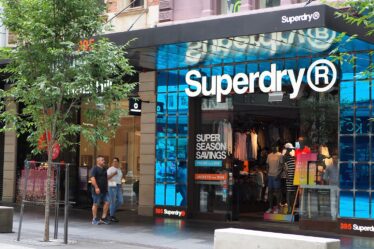
For fashion’s long-suffering start-ups, 2024 may be the year the money starts flowing again.
Menswear brand True Classic, for instance, has hired investment bank Moelis to prepare a pitch deck to present to potential acquirers — including private equity firms and retailers like Amazon — this summer, True Classic’s co-founder and chief executive Ryan Bartlett told BoF. The company, which ended 2023 with a 40 percent year-over-year sales increase to $207 million, is aiming for a $1 billion valuation.
True Classic’s plan is an optimistic departure from the uncertain economic climate and high inflation that brought forth a reckoning for buzzy but unprofitable e-commerce companies last year. Brands and retailers struggled to raise new funding to paper over losses as interest rates reached their highest point in over two decades.
Some ran out of cash. Gen-Z intimates brand Parade sold in an August deal that wiped out equity for its shareholders. Luxury e-tailer Farfetch found itself in a similar situation when it received a $500 million bailout loan from South Korean e-commerce giant Coupang in December, while that same month, Farfetch competitor Matches narrowly escaped bankruptcy, selling to UK retail company Frasers Group. Loungewear maker Lunya wasn’t so lucky, filing for Chapter 11 bankruptcy in June, while children’s apparel label Zulily announced it would shut down in December. Strategics sold off once-prized DTC assets rather than throw good money after bad, with Unilever disposing of Dollar Shave Club, which it purchased for $1 billion in 2016, while Walmart offloaded menswear label Bonobos and plus-sized fashion brand Eloquii in April.
Investors expect to see more fire sales and bankruptcies in 2024. Activewear retailer Bandier said in December it is looking for a buyer to avoid bankruptcy. The Wall Street Journal reported that apparel holding company IHL Group is in talks to purchase influencer Arielle Charnas’ clothing line Something Navy for just $1.
But the beleaguered category might be turning a corner. The economy is improving: retail sales rose 4 percent in November, and consumer sentiment increased 14 percent month over month in December, according to data from the University of Michigan. The Federal Reserve is expected to cut interest rates this year, which lowers borrowing costs and sends encouraging signals to venture capital funds that have largely steered clear of risky fashion investments since 2022. A few of the sector’s biggest names, including Shein, Skims and Vuori, are reportedly planning initial public offerings.
Investors say such conditions could clear the way for a wave of funding, acquisitions and IPOs. Few are predicting a return to the sky-high valuations of 2021, but on balance, the news is likely to be less grim in 2024, particularly for start-ups that are already profitable. For example, in 2023, True Classic’s EBITDA profits ballooned to $19 million, from $4.5 million a year earlier.
“There’s a lot of great brands out there that have not wanted to pursue a [deal],” said Brandon Yoshimura, a director at investment bank Solomon Partners. “They … are probably well positioned to test the market once things are better.”
The New Rules of Fundraising
Venture capitalists soured on money-losing DTC brands in 2023, but in 2024, investors are prepared to start writing cheques once again — only this time, they’ll be focussing on brands with a clear path to profitability, such as those investing in retail partnerships.
The fragrance brand Snif, which launched in 2020, was able to secure an undisclosed sum in early 2023, when funding had all but dried-up for consumer brands, because it went to its existing investors with a plan to launch into Ulta Beauty. That partnership helped Snif double sales in 2023 to over $10 million. The higher sales volume also reduced operating costs like packaging supplies, which improved gross margins. This year, the brand expects to double sales again and has its sights on becoming cash flow positive by the end of the year.
To help reach these goals, Snif plans to raise a Series A round to fund new marketing strategies within its existing retail partners, such as a sampling program in Ulta. The brand also wants to enter more retailers and launch new categories, like scented hand and body creams. In preparation for the upcoming raise, Snif began conversations with like-minded venture firms last year, sending them quarterly business updates for the last eight months.
Ultimately, Bryan Edwards, Snif’s co-founder and co-chief executive, hopes the Series A will be its final fundraise, with future growth funded by its own cash generation. The expectation is that profit generation with the least amount of investment capital will set the tone for a favourable exit down the line.
“There is a next generation of digital businesses that have been built upon the learnings of the first generation,” Yoshimura said. “They’ve learned from that cohort in terms of outcomes, exits, successes and failures, and the businesses that are being built now look completely different.”
Negotiating Power
For more mature start-ups seeking an exit, the landscape is likely to be friendlier in 2024 than it was in 2023 — as long as they have the numbers needed.
Accessories brand Dagne Dover, which currently has a revenue run rate around $100 million, EBITDA profit margins just below 10 percent and more than 70 percent of its sales are done at full-price, held conversations with acquirers and bankers in 2023 to establish relationships, according to co-founder and chief executive Melissa Mash.
Dagne Dover expects a valuation as much as seven times its revenue based on exits at similarly-sized beauty brands, and plans to resume talks this summer.
Some companies are exploring options beyond an outright sale. Digitally native made-to-measure apparel brand Knot Standard, which generates around $15 million in annual sales and broke even for the first time in 2023, for example, is exploring strategic partnerships, such as joining forces with a similarly sized brand that will maximise profits for both companies, according to a person with direct knowledge of the matter.
But companies that have the necessary financials to make these moves also have the ability to be more selective. Dagne Dover, for instance, wants an acquirer that can help it grow sales tenfold, but it doesn’t want to ink a deal that would disrupt its company’s culture. It also isn’t banking on securing an exit this year.
“We’re not looking to ever sell this company and then have the founders leave and move on to something else,” said Deepa Gandhi, Dagne Dover’s co-founder and chief operating officer. The company would look for “a partner that can help truly expedite and find a lot of synergies to take us to a billion dollar brand.”
True Classic is also prepared to postpone its exit plans if it is unable to secure its preferred valuation and desired terms, such as keeping its existing team on board.
“We’re not in a rush,” Bartlett said. “It’s really got to be the right partner. It’s not just about the right check.”



